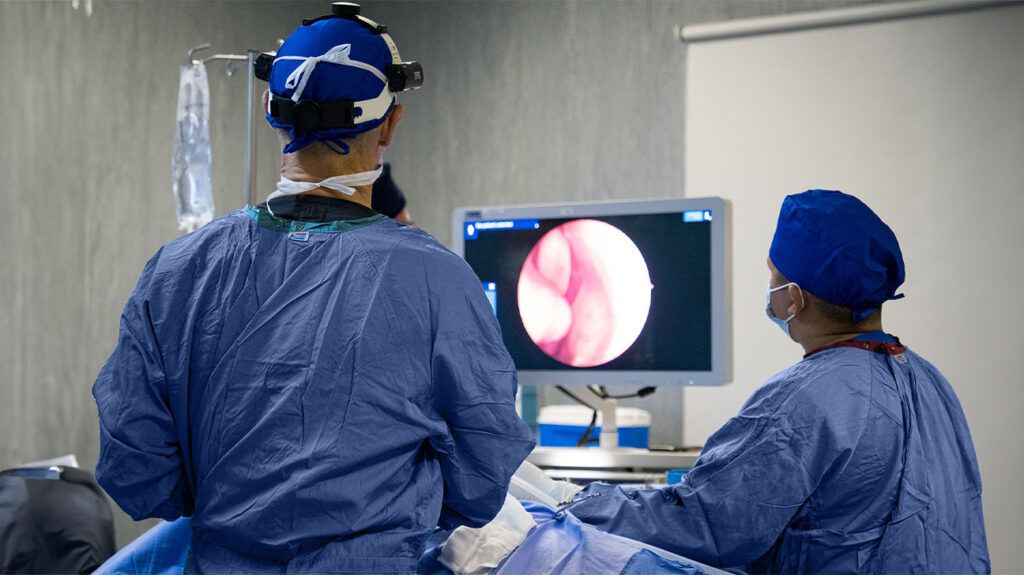Tests for diagnosing stomach cancer can include upper endoscopy, biopsy, and imaging tests. They can help detect if stomach cancer is present and determine the size and location of the tumor.
Tests for stomach cancer can also assess whether the cancer has spread to other areas of the body.
Read on to learn more about how doctors diagnose stomach cancer. This article also looks at when doctors might order the tests, what happens after diagnosis, and more.

Healthcare professionals use several tests to help diagnose and stage stomach cancer. The tests may also help determine treatment options and rule out metastasized tumors, which are tumors that have spread to other bodily areas.
Upper endoscopy
An upper endoscopy can help diagnose stomach cancer. It is a minimally invasive procedure that involves inserting a flexible tube with a camera and other tools through a person’s mouth, down their throat, and into the stomach and upper intestines.
A doctor can use an endoscopy to visually confirm lesions or other areas of potential damage and take a biopsy of potential tumors.
Biopsy
A biopsy involves taking a small sample of tissue from a suspected tumor or lesion. A medical professional can take a biopsy during an endoscopic evaluation.
They will likely take several samples. Some research suggests that taking seven samples increases accuracy to
However, a
After taking the samples, the medical professional sends them to the lab for analysis. Results can indicate the presence of atypical cells and indicate stomach cancer.
Barium swallow
A barium swallow
Barium is a natural metallic substance that helps highlight areas of interest during an endoscopy.
Learn more about what to expect during a barium swallow.
Imaging tests
Doctors may order imaging studies of the chest and abdomen. These can help rule out the presence of metastasized tumors.
Possible tests include:
- an endoscopic ultrasound to help determine the size of the tumor
- a CT scan to help determine the treatment approach
- an abdominopelvic CT scan to check if the cancer has spread
In the United States, healthcare professionals
Symptoms are not specific to stomach cancer and are
- persistent abdominal pain
- indigestion
- difficulty swallowing
- nausea
- feeling full quickly when eating
- internal bleeding that can lead to vomiting blood
- unexplained weight loss
- fatigue
Medical professionals may also order tests to help rule out other possible causes of symptoms.
If they suspect stomach cancer, they will likely order an upper endoscopy and take one or more biopsy samples.
Learn more about symptoms of stomach cancer.
Often, a doctor will start the diagnosis process when a person presents with symptoms that may indicate stomach cancer.
If they suspect an underlying issue, such as stomach cancer, they will
If they suspect possible cancer, they will order screenings, which may include an endoscopy examination, biopsy, and other tests.
After a stomach cancer diagnosis, medical professionals will work with the person to develop a treatment plan.
Several factors can influence treatment, including:
- the stage of the cancer
- the tumor size and location
- the individual’s age and overall health
- whether the cancer has spread to other areas of the body
Smaller tumors
Larger tumors often require surgery to remove them.
Healthcare professionals may also recommend:
- chemotherapy
- radiation therapy
- palliative care
Learn more about treatments for stomach cancer.
Learn more about stomach cancer
The following sections provide answers to some frequently asked questions about stomach cancer.
Is cancer in the stomach curable?
If a person receives a diagnosis of stomach cancer in the early stages, healthcare professionals
However, most cases of stomach cancer are in the advanced stages at the time of diagnosis. It is possible to treat the cancer but not cure it at this stage.
Learn more about curing stomach cancer.
Does stomach cancer spread quickly?
Stomach cancer is a slow growing tumor. In most cases, it will take at least 1 year before the tumor grows large enough for noticeable symptoms to develop.
Generally, diagnosing stomach cancer involves several tests. These can include an endoscopy, biopsy, and imaging studies.
The different tests help confirm the diagnosis, assess the size and location of the tumor, and determine whether the cancer has spread to other areas of the body.
After diagnosis, medical professionals will work with the person to develop a treatment plan according to their specific needs.
